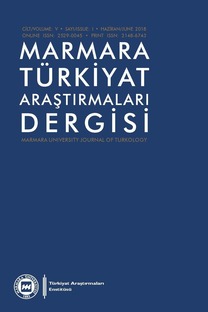Soğuk Savaş Döneminde Türkiye’yi Etkileyen Bir Kriz: ABD İstihbarat Uçağının Düşürülmesi (1 Mayıs 1960)
İkinci Dünya Savaşı sonrası Amerika Birleşik Devletleri’nin (ABD) yüksek irtifa hava keşfi alanında ihtiyacını karşılamak için Lockheed tarafından CL-282 model bir uçak tasarlanmıştı. U-2 olarak bilinen bu proje başlangıçta ABD Hava Kuvvetleri (USAF) tarafından kabul görmemişti. Ancak dönemin ABD Başkanı Eisenhower’ın da desteği ile Merkezi İstihbarat Teşkilatı (CIA) projenin yürütücüsü olmayı kabul etmişti. Özel kamera ve elektronik ekipmanları ile donatılan U-2 uçaklarının temel görevi Sovyet Sosyalist Cumhuriyetler Birliği’nin (SSCB) stratejik askerî tesislerini gözetlemekti. İlk müfrezesi Almanya’da kurulan bu uçakların en bilinen faaliyetleri ise Türkiye’den Adana’daki İncirlik Hava Üssü’nden gerçekleştirilen uçaklarla gerçekleştirilmişti. Adana’daki U-2 birimi olan Müfreze B Pakistan’ın Peşaver, Norveç’in Bodo üslerini de kullanmaktaydı. U-2 için hazırlanan plana Grand Slam Operasyonu adı verildi. Bu operasyon SSCB topraklarını boydan boya geçecek ilk istihbarat uçuşuydu. Bu tarihi uçuş için deneyimli pilotlardan Francis Gary Powers seçilmişti. Ancak Powers’ın pilotu olduğu U-2’nin SSCB sınırları içerisinde düşürülmesi operasyonu planlanmayan bir noktaya taşıdı. Pilotun sağ olarak Sovyetler tarafından ele geçirilmesi yönetilmesi zor bir krize sebep oldu. SSCB, hadisenin ardından ABD ile birlikte onun müttefiklerini de sorumlu tuttu. Bu yönüyle kriz Türkiye’nin de müdahil olduğu uluslararası bir boyut kazandı. SSCB’nin Birleşmiş Milletler (BM) gündemine getirdiği bu olay Türkiye’de konuşlu U-2 müfrezesinin geri çekilmesine neden oldu. Soğuk Savaş’ın dikkat çeken diplomatik krizlerinden olan U-2 hadisesini inceleyen bu çalışmada, tarafların resmî kayıtları, dönemin basını, pilotun hatıraları ve U-2 programı üzerine yapılmış özel çalışmalardan yararlanılmaktadır.
Anahtar Kelimeler:
İstihbarat, Casusluk, Kriz, Diplomasi, Soğuk Savaş
A Crisis Affecting Turkey During the Cold War: the Downing of a US Intelligence Plane (May 1, 1960)
After World War II, an aircraft model CL-282 was designed by Lockheed for the United States of America’s (USA) need for high-altitude aerial reconnaissance. This Project, also known as U-2, was not approved by US Air Force (USAF) in the first place. However, Central Intelligence Agency (CIA) agreed to be the project coordinator, with the support of then-US President Eisenhower. The primary mission of the U-2 aircraft, rigged with specific cameras and electronic devices, was to spy on the strategic military establishments of the Union of Soviet Socialist Republics (USSR). The most well-known activities of these aircraft, whose first detachments were established in Germany, were carried out with the flights taken off from İncirlik Air Base in Adana, Türkiye. Detachment B, a unit of U-2 in Adana, used the Peşaver of Pakistan and Bodo of Norway Air Bases. The plan, designed for U-2, was named Operation Grand Slam. This operation was the first intelligence flight to cross over the USSR territory. Francis Gary Powers, an experienced pilot, was chosen for this historic flight. However, shooting down the Powers’ U-2 in the USSR territory took the operation to an unplanned point. The capture of the pilot alive by the Soviets caused a crisis so difficult to manage. USSR held the USA and her allies responsible. In this respect, this crisis took on an international dimension Türkiye got involved as well. Being a current issue of the United Nations (UN) with the effort of the USSR, this incident caused U-2 detachments stationed in Türkiye to be removed. This article, analyzing the U-2 incident, one of the significant diplomatic crises of the Cold War, used the official records of the parties, the press of that period, memoirs of the pilot, and specific studies on the U-2 program.
Keywords:
Intelligence, Espionage, Crisis, Diplomacy, Cold War,
___
- Armaoğlu, Fahir, Belgelerle Türk-Amerikan Münasebetleri, Türk Tarih Kurumu, Ankara 1991, s. 262.
- Foreign Relations Of The Unıted States (FRUS), 1958–1960, Volume X, Part 1, Eastern Europe Regıon; Sovıet Unıon; Cyprus, United States Government Printing Office, Washington 1993.
- Gülmez, Nurettin, Bülent Tahancı, “Soğuk Savaş Dönemi Çekişmelerinden Bir Örnek: U-2 Uçak Krizi”, Çağdaş Türkiye Tarihi Araştırmaları Dergisi, XIV/28 (2014-Bahar/Spring), s. 199-226.
- Kleyla, Helen ve Robert O'Hern, Directorate of Science & Technology (DST), History of the Office of Special Activities (OSA) From Inception to 1969, Interagency Security Classification Appeals Panel (ISCAP), Washington 2016.
- Mirnoe Sosuşestvovanie s Raznix Toçen Zreniya, İzdanie Çentralnogo Obedineniya Politiçeskix Emigrantov İz SSSR (ÇOPE), Münhen 1960.
- Pedlow Gregory W. ve Donald E. Welzenbach, The Central Intelligence Agency and Overhead Reconnaissance- The U-2 and OXCART Programs, 1954-1974, History Staff Central Intelligence Agency, Washington D.C. 1992.
- Pocock, Chris, 50 Years of the U-2 The Complate Illustrated History of the “Dragon Lady”, A Schiffer Millitary History Book, China 2005.
- Powers, Francis Gary ve Curt Gentry, Operation Overflight The U-2 SPY Pilot Tells His Story For Thhe First Time, United States of America 1970.
- Public Papers Of The Presidents of The Unıted States Dwight D. Eisenhower 1960-1961, U.S. Government Printing Office, Washington 1961.
- Sudebniy Proçess Po Ugolovnomu Delu Amerikanskogo Letçika-Şpiona Frensisa G. Pauersa. Gospolitizdat. Moskova 1960.
- Trial of American U-2 SPY Pilot, Soviet Booklet No.76, Londra 1960.
- United Nations, Report of the Security Council to the General Assembly 16 July 1959-15 July 1960, General Records: Fifteenth Seisson Supplement No: 2 (A/4494), New York 1960.
- ISSN: 2148-6743
- Yayın Aralığı: Yılda 2 Sayı
- Başlangıç: 2014
- Yayıncı: Marmara Üniversitesi
Sayıdaki Diğer Makaleler
Kadere Karşı Koy A.Ş.’yi Bildungsroman Örneği Olarak Okumak
XX. Yüzyıl Başı Tatar Edebiyatında Süyümbike Hanbike İmgesi
Çağdaş Tarih Yazınında Karabağ Hanlığı Tarihinin Paradigmaları Üzerine
Cami Kütüphane Vakfiyelerinden Nizamnamelere Kitapları Koruma Yöntemleri
Türkiye Selçuklu Sultanlarının Yeminleri
Misyonerler ve Tercümanlar: Aydınlanma Çağından Devrim Çağına Fransa’da Türkçe Öğrenmek ve Öğretmek
